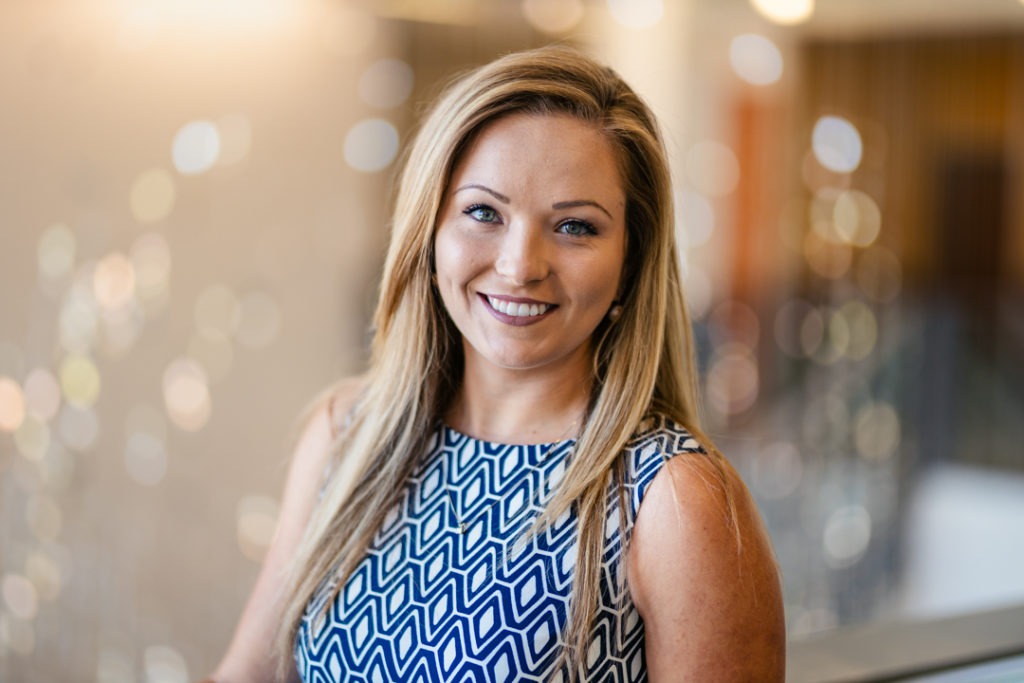
Introducing a Registered Nurse specializing in digital health care
When COVID-19 arrived in Canada, employees in almost every field imaginable were suddenly faced with reinventing how they worked. For many, this included moving to a virtual, online workplace.
“Health care was no exception,” said Hamilton Health Sciences (HHS) registered nurse Carley Ouellette, who specializes in digital health care and is the research project nursing officer for a virtual care trial launched in response to COVID-19.
The trial — called “post-discharge after surgery using virtual care with remote automated monitoring” (PVC-RAM) — is evaluating the effect of virtual care and remote monitoring for patients after surgery, in helping to prevent unplanned hospitalization or emergency department visits.
“I think we will see a need for virtual care long after COVID-19.”
Investing in research and technology is part of HHS’ vision to transform the way health care is provided, in order to deliver a more patient-centred and seamless health care system. This includes opportunities for patients to recover at home through virtual care and remote monitoring technology.
In early March, hospitals drastically reduced non-emergency care due to the pandemic. Patients were sent home earlier after surgery where possible, and many in-hospital appointments were replaced with virtual visits.
A team of researchers and health care providers at HHS and McMaster University introduced this major study to remotely monitor patients after surgery through their joint research centre, the Population Health Research Institute (PHRI). The results so far have been promising.
Training nurses in virtual care
The PVC-RAM leadership team is an interprofessional group of registered nurses and physicians working closely with researchers including principal investigators, site leads and project officers.
Ouellette joined the team as a research project nursing officer, where her job included training 20 HHS nurses in how to provide virtual care. In this role, Ouellette, along with co-principal investigators Drs. Michael McGillion and PJ Devereaux and the research team at PHRI, organized a two-day in-person training session using social-distancing measures. Ouellette trained the nurses on protocols that she and McGillion created, along with the physician team.
With this virtual care system, nurses run the program and use their technology partner’s CloudDX platform to virtually interact with patients. Patients use simple remote monitor technology at home to record their vital signs three times a day, which are sent instantly to a nurse trained in virtual care. The nurse can monitor these vital signs and based on protocols can identify if the patient needs further follow-up.
Teamwork key to success
Nurses have access to a dedicated physician team that helps support and provide care to patients recovering at home. These physicians can also video call with the patient and nurse, using three-way video calling, if needed.
“It’s very much a shared responsibility model, and the collaboration between MDs and RNs has been instrumental to its success,” said Ouellette, whose team is based at HHS, at physically-distanced work stations.
“We’ve already seen many examples where virtual care has helped address serious postoperative complications that might have led patients back into hospital.”
Willingness to learn
“They were learning an entirely new way of doing their jobs.”
The nurses participating in the study came from a wide variety of specialties including hematology, intensive care and emergency medicine. But they didn’t necessarily have the technology skills when they arrived for training.
“We knew clinical care wouldn’t be a challenge since everyone brought such a breadth of experience,” said Ouellette. “But we realized that it was a learning curve for nurses in terms of the technology. They were being trained in an environment where they would no longer have physical contact with patients, like putting a stethoscope on a patient’s chest. They were learning an entirely new way of doing their jobs. This included learning new systems for documentation and retrieving and uploading information.”
The nurses, now fully trained, can each manage 12 to 15 patients per day.
Ouellette also led training for another 70 nurses, via Zoom video conferencing, from St. Joseph’s Healthcare Hamilton and hospital systems in London, Kingston, Ottawa and Edmonton.
“Tip of the iceberg.”
Ouellette works both in person at the HHS virtual care nursing station as well as remotely to help support the other participating sites and oversee program management. She also works closely with the research leadership team to monitor trial operations, data collection and entry, and acts as a liaison between industry partners, health care staff and research personnel.
“I think we will see a need for virtual care long after COVID-19,” said Ouellette. “This is just the tip of the iceberg in terms of virtual care’s potential, and how health care can be transformed.”
Related:
HHS, McMaster University & PHRI launch national, post-operative virtual care study
